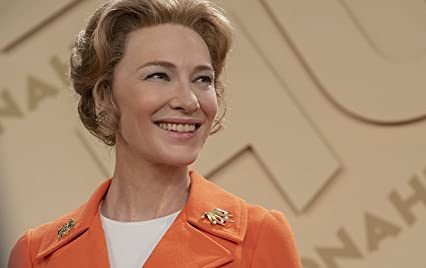Hayley Long looks at the power and poignancy of Mrs America, the new star-studded BBC drama that tells the story of the efforts to ratify the Equal Rights Amendment in America in the 1970s and 80s, and how it tells many truths of the state of the nation, and its politics, today.
(Warning: this article is absolutely riddled with spoilers)
Nothing is straightforward. Just as I was reaching the conclusion that no good would ever come of 2020, the BBC chucked a nice surprise into the mix and gave us all Mrs America, one of the finest dramas to appear on our television screens in years.
This beautifully produced nine-episode miniseries lets us escape the present day and whisks us instead to a Covid-free world of trim phones, typewriters and aviator glasses, all set to a fantastic soundtrack of soul, funk, rock and punk. Oh, and there’s also rampant sexism, not-so-casual racism and the kind of wallpaper that might give you a migraine. This is 1971 and we are in for a nine-year ride taking us steadily through the decade and right up to the point of Ronald Reagan’s Republican landslide election victory in 1980. But unusually — and as the title of the series clearly indicates — the focus is not on Ronald Reagan or on any other man; this time, the lens is fixed firmly on America’s women and the political tug-of-war which was taking place between them.
 On the one side were all those women seeking to see sexual equality written into the US constitution via the Equal Rights Amendment (ERA), and on the other was an equally determined group of conservative and often churchgoing women who were hellbent on stopping that from ever happening. At the head of this latter band was one Phyllis Schlafly, a powerhouse in pearls, a mother of six and a shrewd operator to boot. Much of the dramatic genius of Mrs America lies in the perhaps surprising decision to make the reactionary Schlafly — played by Cate Blanchett — the central figure in this compelling story of womanhood and what that might mean.
On the one side were all those women seeking to see sexual equality written into the US constitution via the Equal Rights Amendment (ERA), and on the other was an equally determined group of conservative and often churchgoing women who were hellbent on stopping that from ever happening. At the head of this latter band was one Phyllis Schlafly, a powerhouse in pearls, a mother of six and a shrewd operator to boot. Much of the dramatic genius of Mrs America lies in the perhaps surprising decision to make the reactionary Schlafly — played by Cate Blanchett — the central figure in this compelling story of womanhood and what that might mean.
Did I just mention Cate Blanchett? She’s so utterly convincing as Phyllis Schlafly that it’s easy to forget that Blanchett is ever there. In actual fact, Blanchett’s fingerprints are all over this series — as an executive producer — and she reminds us that, once again, nothing is straightforward. Blanchett’s portrayal of Schlafly is a masterclass in the nuance of human facial expression. As Schlafly, she smiles infectiously and grins with a steely resolve when she hurts. She flicks her eyes in irritation and draws us in with a momentary twinkle that is pure flirtation. She is seductive, she is cajoling, she is charming and, beyond all else, she is supremely confident. And even when she’s doing deals with deer-shooting evangelicals or telling her gay son to ‘exercise willpower’, it is still difficult to dismiss her entirely as a wholly unsympathetic villain — the awkward truth is that she simply has too many qualities that are enviable, admirable and unmistakably human. But, hey, lest we forget, Phyllis Schlafly is also that traitorous pain in the neck doing her damnedest to beat ‘the libbers’ so that all other women can stay tucked up in the home making apple pies forever. Blanchett may perhaps have done the real Phyllis Schlafly some presentational favours, but in this incarnation at least, Schlafly serves as a reminder that people are often extremely complicated.
Just as Mrs America gives us a disconcertingly alluring villain, it also gives us flawed heroes — or should I say sheroes? At the front of the feminist charge is Gloria Steinem, a charismatic and beautiful young journalist, played by Rose Byrne. Byrne’s Steinem is the epitome of cool who turns the heads of both men and women — but does she have the same energy as Blanchett’s Schlafly? No, she doesn’t. In comparison, she’s positively lethargic. Mostly, she smokes and frowns and smokes and frowns and then — with a frown — lights up another cigarette. But if Byrne gives us a somewhat world-weary Steinem, it is a portrayal which smacks of realism. Trying to change the US constitution so that women can, at last, have an equal slice of the pie may sound like a joyous and sisterly undertaking but this drama shows it to be a much more thorny enterprise.

One of Steinem’s closest allies was Betty Friedan, an older and often very abrasive woman who kickstarted the second wave of feminism with her 1963 book, The Feminine Mystique. Today, Friedan remains a divisive figure and is frequently remembered either for her contribution to women’s liberation or for her reluctance to support lesbian politics. In Mrs America, Friedan is played by Tracey Ullman whose ability to disappear into her own performance rivals even Blanchett’s vanishing act. The relationship between the young poster girl of feminism and the older outspoken feminist is uneasy. In episode four, Steinem describes Friedan as having ‘a difficult personality’ and is quietly reminded by a mutual friend that ‘we get to do what we do because she risked everything…. Consider just saying thank you.’ Steinem listens and compromises accordingly. After Friedan receives a brutal trouncing on live television at the hands of Schlafly, Steinem rings Friedan to say thank you. It is one of several moments in this drama that brought a tear to my eye.
Steinem makes another compromise which is less pretty to watch. When black congresswoman Shirley Chisholm (Uzo Aduba) announces her intention to run as a candidate in the 1972 presidential campaign, she is met with ambivalence from Steinem and downright hostility from some others who ought to be her natural allies. But this is the cold hard world of politics and Chisolm is deemed to be an unlikely bet for the White House and therefore not the best vehicle to further the ratification of women’s rights. That honour falls to the time-honoured white male candidate instead —in this instance, George McGovern. Lacking the support she needs, a dispirited Chisholm is forced to curb her dreams and throw her lot in with McGovern too. But even though her relationship with Steinem et al is shaken, it remains intact. Their shared cause is more important, and these women live in a pre-Twitter world which does not demand a consensus of opinion.
Anyone who has sat through all nine episodes of this series or who hasn’t yet seen any of it but is still sweetly reading this review, won’t need me to tell them that Mrs America isn’t just entertainment — it’s a much needed herstory lesson and a dramatic portrait of the tension that (still) exists between domesticity and ambition. Just as it is inescapable in the day-to-day considerations of most women, thoughts — and symbols — of the domestic are inescapable in this production. There is the patriotic homemaker referenced in the title, of course. And then there are the opening credits which are so good that they are worthy of a review of their own. The battleground that is American womanhood in the seventies is depicted in a cartoon that looks so authentically of the era that it might have been made by Hanna-Barbera. Accompanying it is ‘A Fifth of Beethoven’ — Walter Murphy’s 1976 disco remake of Beethoven’s 5th symphony. We can only imagine that Steinem once danced to this track on a smoke-filled dancefloor while a horrified Schlafly thought it an unnecessary meddling with the classical. As the images roll past us, we see marching women carrying pro-ERA banners before being encased in a pie that is in a shopping trolley being pulled by Schlafly. In Schlafly’s other hand, she is rallying her STOP-ERA troops with a loud-hailer. We see Shirley Chisholm’s campaign bus and Steinem behind her typewriter. But the last clear image we are shown is Schlafly’s army of supporters led by a frontline of women pushing hoovers. However much we might want it to go away, housework hangs around.
All the women in this drama are struggling with the domestic in one way or another. As well as fighting for equal rights, Betty Friedan is trying to be the best mother that she can be, even though this means she must graciously share her daughter with her ex-husband’s new wife. (This, incidentally, was another scene that made me cry.) Then there is Gloria Steinem who stops frowning just long enough to throw a wistful look in the direction of her boyfriend’s children — in another episode, both the boyfriend and his kids are gone and never mentioned again. Having career ambitions and wanting an equal slice of the pie does not mean that all the things that Schlafly holds sacred are not important to the feminists too. But nobody can have everything that they want, and Mrs America skilfully and poignantly allows us to watch these women as they make compromises in order to get the best balance that they can.
And finally, our attention is drawn back to Schlafly. Does she really believe that women should be housewives above all else? If so, why does she spend so much time dumping all her housework on to her maid and her sister-in-law while she focuses, instead, on law and politics? As I said way back at the start, nothing is straightforward. Especially when it concerns that difficult and often inseparable trinity of domesticity, ambition and compromise. Throughout the series, Phyllis Schlafly seems to be juggling all three and winning. She fulfils her dubious political ambition by presenting influential senators with gifts of homemade bread and jam in order to remind them that a woman’s place is in the home. And ultimately — in the final devastating scene — she gets exactly what she has been fighting for.
It is 1980 and the USA has a new right-wing president, Ronald Reagan. Steinem and her friends are down but, happily, they are not out — the fight will go on. Meanwhile, Schlafly — who had been anticipating a place in Reagan’s government — has been politely informed that she will not be needed after all. Poor misguided Phyllis has crashed headfirst into a glass ceiling. If only she’d realised how frustratingly unfair this patriarchal system is. The closing shot is of Blanchett’s Schlafly in her kitchen. Her face is a mask of inscrutability. We watch — revelling in a delicious meanness — as she silently peels apples so that she can make her husband an apple pie.
Mrs America is available to watch now on the BBC iPlayer.
Hayley Long is an author and creative writing tutor.












